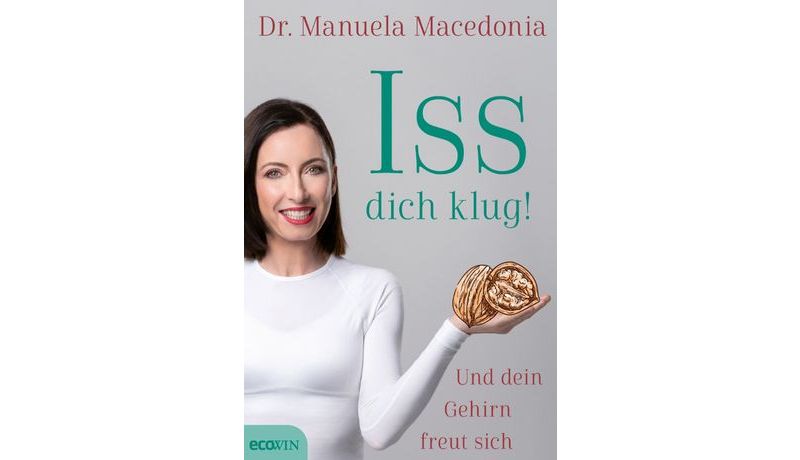Can dementia really be prevented? In part. A new book by JKU neuroscientist Manuela Macedonia reveals how.

Dr. Manuela Macedonia is a neuroscientist at the Institute of Business Informatics - Information Engineering. Her new book sheds light on how nutrition impacts the brain, from elastic cell walls to developing neuroses.
You are a neuroscientist at the JKU and an author. Your new book, "Iss dich klug", comes out today. Aren't there already enough nutritional information books out there?
Dr. Manuela Macedonia: This is not a nutritional information book in the true sense of the word. My book not only talks about the link between nutrition and the way the brain functions, but also to what extent we can consciously "nurture" the brain by eating nutritionally well, and how bad foods can be harmful. My specialized book focuses on the latest research in this area and the information is presented in a way that everyone can understand. One doesn’t have to be a neuroscientist in order to read the book.
Can you actually eat to become smarter?
Dr. Manuela Macedonia: The way we eat greatly influences the brain and, in turn, impacts our mental abilities and our psyche. Eating the right foods can, for example, effectively improve memory and stabilize the psyche. High quality nutrition "takes care" of the brain system. It is actually all about maintaining healthy cells. If our cells are in good shape, they serve us well from cradle to grave.
What kinds of foods are considered unhealthy and how does that affect us?
Dr. Manuela Macedonia: Heavily processed foods and junk food can actually harm our brains. The trans fats in many of these kinds of foods cause inflammation in the body and ultimately to the brain as well. This kind of inflammation alters the brain tissue and, over time, can impair our mental capacities, thereby increasing our susceptibility to mental illness. When we’re older, the right kind of diet can delay - even prevent - dementia, but a poor diet can have the opposite effect.
So, what is a healthy diet?
Dr. Manuela Macedonia: Our brain cells thrive when we eat vegetables, fruit, fermented dairy products, and high-quality oils. Junk food, and highly processed food in general, should only be consumed in moderation.
Do you follow the nutritional information in your book?
Dr. Manuela Macedonia: Yes, I enjoy food but I don't want to develop a food neurosis. While I enjoy chips and a good Austrian-style roast pork, I understand how unhealthy fats can damage the brain so wherever possible, I try to do without these kinds of foods. There are some foods I don't buy at all so that I'm not tempted to eat them at home!
As a neuroscientist, what is your advice to overcome the temptation?
Dr. Manuela Macedonia: There is no one particular way. It’s all very individual but I find what works for me is just imagining the increased risk of dementia simply by eating the wrong kinds of food. This is enough to overcome temptation and focus on fresh, high-quality homemade meals. My motto is: I don't eat to maintain my figure, but to maintain my brain!
What do you do outside of work?
Dr. Manuela Macedonia: Exercise! My life consists of work and exercise. I love my work as I find it fascinating and there is so much to learn and expand on. As a scientist, I am constantly challenged to experience and learn new things; ‘boredom’ and ‘routine’ are foreign words. I consider sport and exercise to be an elixir of life. I run two to three times a week and during the winter, I save Saturdays and Sundays for skiing (back-country alpine skiing or cross-country skiing) and during the summer, I enjoy mountain biking. In that regard, I don’t really have any hobbies because I don’t have the time... Well, I guess writing popular scientific books could be regarded as a hobby. I want to give those interested access to the most recent findings in neuroscience, otherwise it would all be hidden away in science databases and the information would not get to those in the real world who actually make science possible through their tax contributions!
Did you know ...
...the human brain contains around 86 billion nerve cells (neurons)?
...the brain can perform around 1013 analog computing operations per second?
...the brain makes up only 2% of and adult’s mass but requires 20% of the body’s energy?









